
Missamma is a 1955 Indian Telugu-language romantic comedy film directed by L. V. Prasad. It was produced by Nagi Reddi and Chakrapani on Vijaya Productions banner. The film stars N. T. Rama Rao, Savitri, Akkineni Nageswara Rao and Jamuna. The script was adapted by Chakrapani from Rabindranath Maitra's Bengali play Manmoyee Girls' School. It revolves around two unemployed people — M. T. Rao and Mary — who pose as a married couple to obtain employment in a high school founded by Gopalam, a zamindar. As Rao and Mary fall in love, Gopalam's nephew A. K. Raju learns that Mary is Gopalam's missing elder daughter Mahalakshmi; she is unaware of her true identity.

P. Bhanumathi Ramakrishna was an Indian actress, singer, film producer, director, music composer, and novelist. She is regarded as the first female super star of Telugu cinema. She is also considered the first female director of Telugu cinema with her debut directorial Chandirani (1953). Bhanumathi appeared in over 100 films predominantly in Telugu and Tamil languages. She was awarded the Padma Bhushan in 2001 for her contribution to the Indian cinema. She was honored among "women in cinema" at the 30th International Film Festival of India.
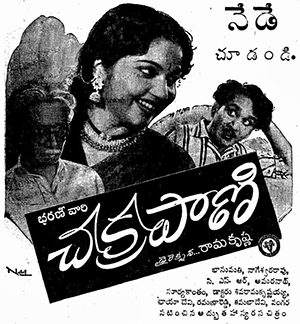
Chakrapani is a 1954 Indian Telugu-language comedy film, produced and directed by P. S. Ramakrishna Rao under the Bharani Pictures banner. It stars Bhanumathi and Akkineni Nageswara Rao with music composed and songs sung by Bhanumathi.

Donga Ramudu is a 1955 Indian Telugu-language drama film co-written and directed by K. V. Reddy. It stars Akkineni Nageswara Rao, Savitri, Jamuna, and Jaggayya with music composed by Pendyala. The film was produced by D. Madhusudhana Rao under the Annapurna Pictures banner.

Rojulu Marayi is a 1955 Indian Telugu-language drama film directed by Tapi Chanakya. It stars Akkineni Nageswara Rao, Sowcar Janaki with music composed by Master Venu. The film was produced by C. V. R. Prasad on Sarathi Films banner.
P. Pullayya was an Indian film director and producer known for his work in Telugu films. He was the recipient of Raghupathi Venkaiah Award for his contributions to Telugu cinema.

Vara Vikrayam is a 1939 Telugu drama film directed by C. Pullayya. The film is a reformist social film about the dowry system prevalent in British India. It is based on the novel and play of the same name by Kallakoori Narayana Rao. It is the debut film for Bhanumathi.
T. L. V. Prasad is an Indian film director who predominantly worked in Hindi and Telugu cinema.. He is the director of nearly 70 Hindi films and 35 Telugu films. He also directed a few films in Bengali.
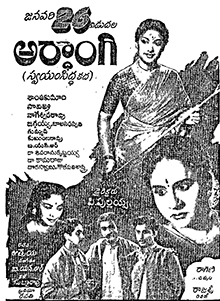
Ardhangi is a 1955 Indian Telugu-language drama film, produced and directed by P. Pullayya under the Ragini Pictures banner. It stars Santha Kumari, Savitri, and Akkineni Nageswara Rao. Music is composed by Master Venu and B. Narasimha Rao. Acharya Aatreya scripted the film based on Maddipatla Suri's Telugu translation of the Bengali novel Swayamsidda written by Manilal Banerjee. The film was successful at the box office. It has received the National Film Award for Best Feature Film in Telugu and the Filmfare Award for Best Film - Telugu. The film was remade in Tamil as Pennin Perumai and in Hindi as Bahurani (1963).

Premabhishekam is a 1981 Indian Telugu-language romantic drama film written and directed by Dasari Narayana Rao. Produced by Venkat Akkineni and Nagarjuna Akkineni under Annapurna Studios banner. It stars Akkineni Nageswara Rao, Jayasudha, Sridevi, Murali Mohan, Mohan Babu and music composed by Chakravarthy. This film is copied from "send me no flowers" 1964 hollywood movie. Released on 18 February 1981, Premabhishekam was a commercial success and industry hit grossing over ₹4crore at the box office. It had a theatrical run of 527 days and became the first film to complete a 75-week run in Andhra Pradesh. The film won four Nandi Awards and two Filmfare Awards South. It was later remade in Tamil as Vazhvey Maayam and in Hindi as Prem Tapasya

Manushulu Mamathalu is a 1965 Indian Telugu-language drama film produced by A. V. Subba Rao under the Prasad Art Productions banner and directed by K. Pratyagatma. It stars Akkineni Nageswara Rao, Savitri and Jayalalithaa, with music composed by T. Chalapathi Rao. T. Rama Rao worked as associate director for this film. This picture is also remembered to be Jayalalithaa's Telugu debut as a leading actress. This was the first Telugu film to ever receive an A certificate from the Censor Board.
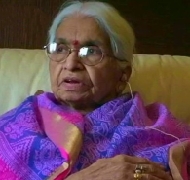
K. Rani was an Indian playback singer who has sung songs in Telugu, Tamil, Kannada, Malayalam, Sinhalese, Hindi, Bengali and Uzbek. Rani was the first female singer from India to sing in Sinhalese and Uzbek, and sang the national anthem of Sri Lanka.

Missamma is the soundtrack of the 1955 Indian Telugu-language film of the same name directed by L. V. Prasad. Composed by S. Rajeswara Rao, the soundtrack contains 11 songs with lyrics by Pingali. The film was written by Chakrapani, who co-produced it with B. Nagi Reddi for Vijaya Productions. N. T. Rama Rao and Savitri played the lead roles the Telugu version, with Akkineni Nageswara Rao, Jamuna, S. V. Ranga Rao, Rushyendramani, Relangi and Ramana Reddy in supporting roles.

Bharya Biddalu is a 1972 Indian Telugu-language drama film, produced by A. V. Subba Rao under the Prasad Art Productions banner and directed by T. Rama Rao. It stars Akkineni Nageswara Rao, Jayalalithaa and music composed by K. V. Mahadevan. The film is a remake of the Telugu-language film Bratuku Theruvu (1953), also starring Nageswara Rao.
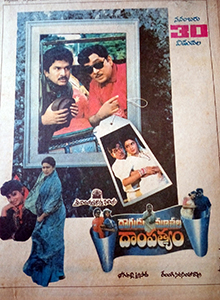
Dagudumuthala Dampathyam is a 1990 Indian Telugu-language comedy film, produced by Bogavalli Prasad and directed by Relangi Narasimha Rao. Starring Akkineni Nageswara Rao, Rajendra Prasad, Sharada, Vani Viswanath, Ramya Krishna, and music composed by M. M. Keeravani. The film recorded as Super Hit at the box office.
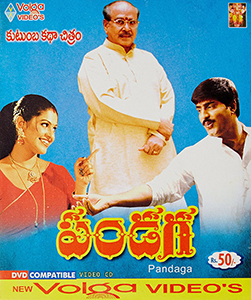
Pandaga is a 1998 Telugu-language drama film directed by Sarath. It stars Akkineni Nageswara Rao, Srikanth, Raasi and music composed by M. M. Keeravani. It is produced under the Jayasri Art Pictures banner. It is a remake of the Malayalam film Katha Nayagan (1997).

Missiamma is a 1955 Indian Tamil-language romantic comedy film directed by L. V. Prasad. Produced by B. Nagi Reddy and Aluri Chakrapani's Vijaya Vauhini Studios, the script was adapted by Chakrapani from the Bengali novel Manmoyee Girls School by Rabindranath Maitra. Missiamma also focused on social issues such as unemployment, corruption, and freedom of worship. Missiamma tells the story of two unemployed people of different religions and mentalities: Balu and Mary. They pose as a married couple to obtain jobs in a high school founded by Gopal, the zamindar of Aandipettai. As Balu and Mary fall in love, Gopal's nephew Raju learns that Mary is Gopal's missing elder daughter Mahalakshmi; she is unaware of her true identity.
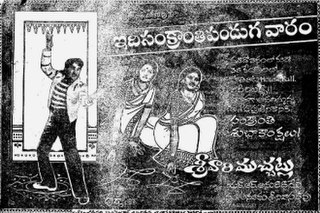
Srivari Muchatlu is a 1981 Telugu-language drama film, produced by N. R. Anuradha Devi under the Lakshmi Films Combines banner and directed by Dasari Narayana Rao. The film stars Akkineni Nageswara Rao, Jaya Prada, Jayasudha and music composed by Chakravarthy. The film is remade in Hindi as Asha Jyoti (1984).
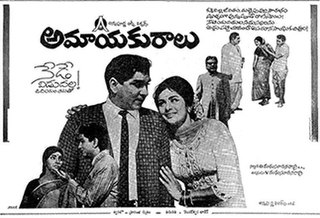
Amayakuralu is a 1971 Indian Telugu-language drama film, produced by D. Madhusudhana Rao under Annapurna Pictures and directed by V. Madhusudhana Rao. It stars Akkineni Nageswara Rao, Kanchana, Sharada and music composed by S. Rajeswara Rao. The film won the Nandi Award for Third Best Feature Film.

Manase Mandiram is a 1966 Indian Telugu-language romantic drama film, produced by Yarra Appa Rao and directed by C. V. Sridhar. It stars Akkineni Nageswara Rao and Savitri, with music composed by M. S. Viswanathan. The film was a remake of Sridhar's own Tamil film Nenjil Or Aalayam (1962).
















